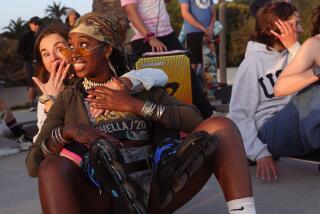FREE ENTERPRISE / A Wheel Grind
- Share via
The aroma of Blueberry ‘Ks became so overwhelming that even Tribe CEO Mark Heineken could not stomach them. The in-line skate industry’s first fruit-flavored wheels were designed for grinding down banisters and curbs in the great outdoors; within the recycled air of his Huntington Beach office, they were less than kind to the olfactory senses. “The scent is actually in the urethane,” Heineken explains, “and when the wheels get worn, they’re smelly.” He stocked four boxes in his office after the product launch, but not for long. “We had to throw them out,” he says, “because it’s like air freshener.”
Like most wheels in the company’s Senate skate line, Blueberry ‘Ks took their inspiration from the extreme skater in both inspiration and design. Dave Kollasch, holder of the longest in-line rail slide on record, happened to eat a lot of Special K cereal, and so his signature wheels were sealed in a miniature breakfast cereal box. The product was upgraded this past season after Kollasch revealed the identity of his favorite fruit to heap atop his bowl. Similarly, the Senate TJ Webber model is a tribute to that pro skater’s love of cigarettes. TJ Webbers come in an economy-sized box of safety matches; a circular cartoon of crushed butts decorates the sidewalls of the wheels.
Milk cartons, pizza boxes, plain paper bags, candy-bar wrappers--all of these packaging devices have been commandeered for the skate line. Stars and stripes, graffiti tags and Far Eastern tattoos can be found on the wheels themselves.
With his brushed-forward peroxide coiffure, his more realistically blond goatee and noticeable surfing scars traversing his forehead, Heineken still bears traces of the extreme athlete he recently was. As a sponsored in-line skater, the native Dutchman toured the world, launching himself off vertical ramps and designing skates for the top Italian company Roces.
After he relocated to Venice Beach in 1993, Heineken and some other pro skaters commiserated over the sad lack of equipment for their extreme sport. The existing wheels were built for speed or recreation, not for serious pounding, and they would crack under the stress. Nor had the market yet satisfied a demand for “anti-rockers”--midget wheels used not so much for rolling as for locking the skate onto a banister or curb as the aggressor grinds on down.
“We wanted to make in-line skating cool,” the 28-year-old Heineken says, “because we thought it was lame. It was all dictated by the big corporations. The clothing they made was ridiculous. We had to wear pink and purple because that was the only thing that was available, and everyone laughed at us, because in-line skating was just dumb. The sport was really fun, but the image was dumb.”
Amassing $2,000 among them, Heineken and an informal consortium of in-line pros--including Arlo Eisenberg, this year’s in-line skate winner at ESPN’s Extreme Games--commissioned their first batch of wheels in 1993. They named their company after the more august house of Congress. To conform to the “Senate” theme, the first product was called the “Bribe,” followed by the “C-Note.”
The company has expanded into grind-plates, bearings, backpacks, T-shirts, socks, jeans, key chains and combs--all shipped from a warehouse that adjoins its offices. Success has inevitably brought its share of mild headaches. Kellogg’s has fired off a cease-and-desist order for the Dave Kollasch Blueberry ‘Ks. Senate Plastic Wrenches, an in-line grind-plate, bore enough resemblance to an enormous pack of brand-name spearmint gum to launch a lawsuit.
Silver hoops dangling from both earlobes, his baggy Senate blue jeans spilling onto a pair of untied Timberlands, Heineken does his best to debunk his own role as a rising corporate champion. “If you think about a CEO, you think about a 50-year-old man with a suit that makes millions of dollars. It’s not really the same here. I wish.”

